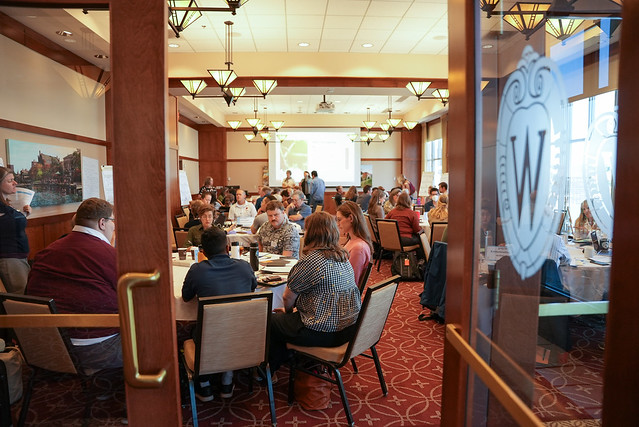

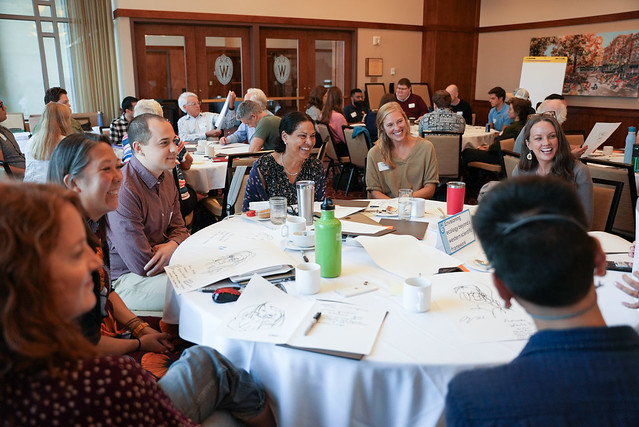
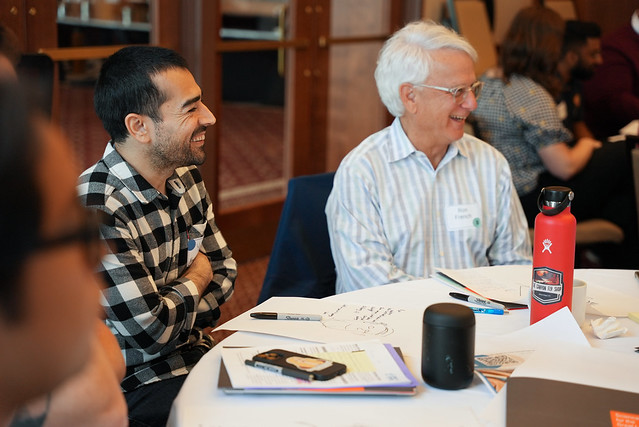
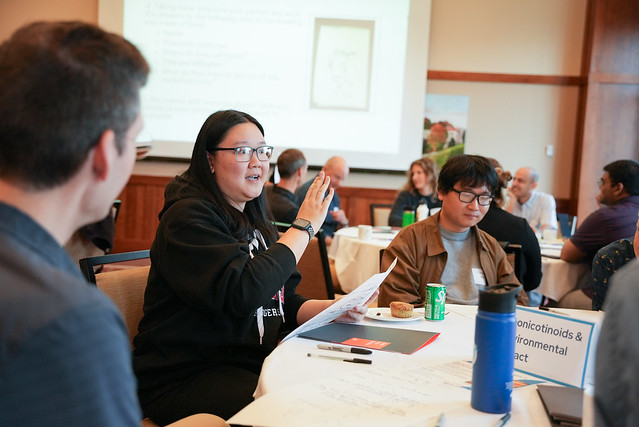
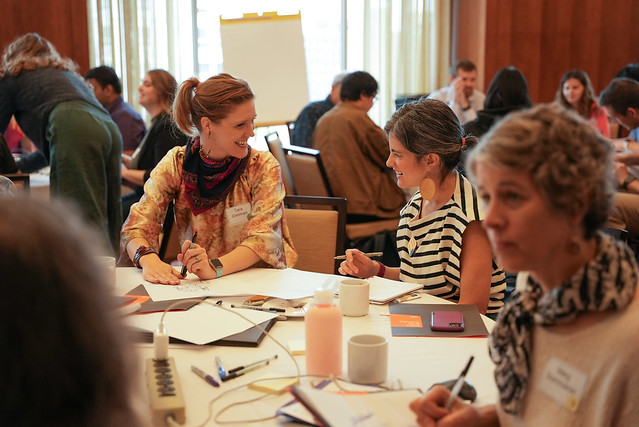
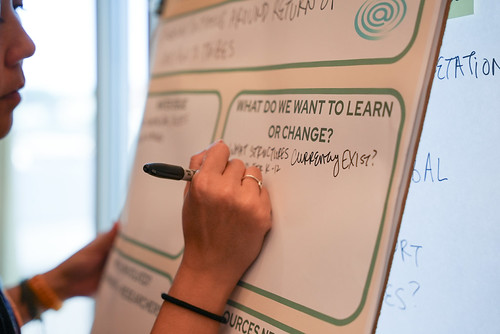
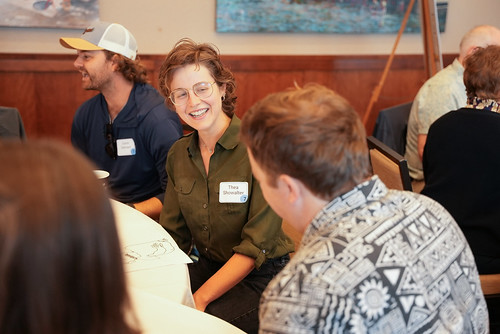
In September, Water@UW-Madison partnered with Wisconsin Sea Grant to convene a “Water Partnership Workshop,” where researchers and community members tackled water challenges together. Read more about the event, the outcomes, and find some great ideas for collaboration on our Workshop Page
Funding for the Community-Based Water Research Seed Grant Program is not available for the 2025-2026 academic year. We will communicate additional opportunities to engage communities in research processes on this page as they develop.
Learn more about the completed projects by browsing our Community-based water research StoryMap.
Projects funded in 2025
From Stormwater to Canopy: Evaluating Passive Irrigation and Structural Soils for Urban Climate Resilience in Madison, Wisconsin
Anna Bierbrauer, Faculty, Planning & Landscape Architecture
Ryan Stowe, Faculty, Department of Chemistry
Amanda Buchberger, Associate Director Analytical Chemistry Labs, Department of Chemistry
Peter Jaeger, Outreach Program Manager, Department of Chemistry
Ian Brown, City Forester, City of Madison
Phil Gaebler, P.E., Water Resources Engineer, City of Madison
Eric Knepp, Parks Superintendent, City of Madison
Zixuan Ann Tai, ASLA, PLA, Associate, Sasaki
Andrew Sell, ASLA, PLA, Associate, Sasaki
Best water management practices for climate resilience and justice under smallholder market production in Chiquimula, Guatemala
Claudia Irene Calderón, Teaching Faculty, Plant and Agroecosystem Sciences
Chris Lewis, Graduate student, Nelson Institute for Environmental Studies
Matt Turner, Faculty, Geography & Nelson Institute for Environmental Studies
Centro Universitario de Oriente, Universidad de San Carlos (CUNORI)
José Ramiro García, Coordinator of the Department of Environmental Management
Kerim Ronaldo Orellana, Coordinator of the Extension Unit
Nery Galdámez Cabrera, Head of the Research Institute
Carlos Ramirez, Professor of Land Administration
Asociación Regional Campesina Ch’orti’ (ASORECH)
Danilo Guerra, Technical Manager of Projects
Salvador Leiva, Production Specialist
Dayana Argueta, Production Specialist
CUNORI student intern
Grounded in the community: from data-focused investigations of groundwater sustainability to informing action in Richland County
Athena Nghiem, Faculty, Geoscience
Logan Goulette, Graduate Student, Geoscience
Savannah Finley, Graduate Student, Environmental Chemistry and Technology, Department of Civil and Environmental Engineering
Ellen Tyler, Senior Community Resiliency Planner, Southwestern Wisconsin Regional Planning
Commission
Kaysee Beckstrom, Local Partnerships Manager, Clean Wisconsin
Kayla Rinderknecht, Population Health Service Fellow, Clean Wisconsin
Crystalline Hydrogeology Exploration for Environmentally Sustainable Extraction (CHEESE)
Christopher Zahasky, Faculty, Geoscience
Madeline Gotkowitz, Hydrogeologist, Water Use Section, Wisconsin DNR
Ben Degner, Graduate Student, Department of Geoscience
Brian Forrest, Owner of Maple Ridge Dairy in Stratford, WI
Josh Mullins, Owner of Mullins Cheese in Stratford, WI
Nancy Esser, Superintendant, Marshfield Agricultural Research Station
Ashley Blackburn, Assistant Superintendent, Marshfield Agricultural Research Station
Good Water: Supporting the Lac Courte Oreilles Fight to Bring Quality Drinking Water to a
Tribal Community in Need
Hannah S. Richerson, Graduate Student, Nelson Institute for Environmental Studies & Wisconsin Attorney
Matthew Ginder-Vogel, Faculty, Department of Civil and Environmental Engineering
Brian Bisonette, Executive Director of Division of Land Management, Lac Courte Oreilles Band of Lake Superior Ojibwe
Willard Gouge, Director of Public Works, Lac Courte Oreilles Band of Lake Superior Ojibwe
Melissa Lewis, Wetlands/Wild Rice Biologist, Lac Courte Oreilles Band of Lake Superior Ojibwe
Tracey Mofle, GIS Specialist, , Lac Courte Oreilles Band of Lake Superior Ojibwe
Projects funded in 2024
Starkweather creek community restoration project
Anna Bierbrauer, Faculty, Planning & Landscape Architecture
Evelyn Howell, Faculty, Planning & Landscape Architecture
David Bart, Faculty, Planning & Landscape Architecture
Chris Luhman, Supervisor, LabCorp
Developing Community-Informed Flood Management Strategies in Madison
Paul Block, Faculty, Civil & Environmental Engineering
Marian Azeem-Angel, Graduate Student, Nelson Institute of the Environment
Cristina Carvajal, Executive Director, Wisconsin Ecolatinos
Jim Wolfe, Principal Engineer, City of Madison Engineering Office
Raising Public Awareness of Emerald Ash Borer in Black Ash Wetlands through Science, Storytelling, and Indigenous Art
Nan Li, Faculty, Department of Life Sciences Communication
Annie Jones, Faculty, UW-Extension, Community and Environmental Sociology
Sherry LaChapelle (Corn), Tribal Artist, Menominee Tribe of Wisconsin
David Grignon, Director, Historic Preservation Department, Menominee Tribe of Wisconsin
Douglas Cox, Director, Land Management at Menominee Indian Tribe of Wisconsin
Source Identification of Fats, Oils and Grease Clogs in Madison Sewer System
Erica Majumder, Faculty, Bacteriology
Allondra M. Woods, PREP post-baccalaureate scholar, Bacteriology
Catherine J. Pettinger, Graduate Student, Molecular & Environmental Toxicology, Bacteriology
Catherine Harris, Pollution Prevention Specialist, Madison Metropolitan Sewerage District
Kathy Lake, Pollution Prevention Manager, Madison Metropolitan Sewerage District
Projects funded in 2023
A community based approach to salt reduction in the Lake Wingra watershed
Hilary Dugan, Faculty, Center for Limnology
Lizzie Emch, Graduate Student, Center for Limnology
Adrianna Gorsky, Graduate Student Center for Limnology
Allison Madison, WI Salt Wise Program Manager, Capital Area Regional Planning Commission
Julia Whidden, Citizen Science Coordinator, UW-Madison Arboretum
Bridging Native and Settler Stories of Maple Island to Envision Its Future
Caroline Gottschalk, Department of English
Marty Holtgren, Principal Scientist, Muskegon River Watershed Assembly
Alex Forist, Chief Curator, Grand Rapids Public Museum
Stephanie Ogren, Vice President of Science & Education, Grand Rapids Public Museum
Jimmie Mitchell, Little River Band of Ottawa Indians, Muskegon River Watershed Assembly Board
Matt Schultz, Curation & Digital Preservation Specialist, Fringe Digital LLC
Drinking Water (In)Justices: Water Systems, Quality Monitoring, and Sensing Toxicity
Kallista Bley, Ph. D. Student, Department of Geography
Empowering Sandbranch through Hydropanels and Community-Based Research: A 30-Year Journey to Address Water Insecurity in the Urban-Fringe
Laura Joaquina Morales-Whetstone, Ph.D. Student, Urban and Regional Planning
Tonnette Byrd, Director, Until Justice Corporation
Waadookawaad Amikwag ecological assessment collaboration
Geoffrey Siemering, Soil Science
Abby Sunde, undergraduate
Victoria McMillen, Communications Lead, Waadookawaad Amikwag
Freshwater biodiversity science for young community scientists
Jessica Hua, Faculty, Department of Forest and Wildlife Ecology
Chong Thao, Elementary Program Coordinator, Bayview Foundation
Zuzana Burivalova, Department of Forest and Wildlife Ecology
Grace Ingram, Research Intern, Department of Forest and Wildlife Ecology
Zaaga’iganan Kinship Project: Defining the past, present, and future state of northern Wisconsin lake health and research
Raymond Allen, Post-doctoral Researcher, Center for Limnology – Trout Lake Research Station
Celeste Hockings, Director of LDF Tribal Natural Resources, LDF Tribal Natural Resources
Andre Virden, Great Lakes Restoration Initiative Coordinator, LDF Tribal Natural Resources
Aubrey Racz, Public Health Specialist, Great Lakes Inter-Tribal Epidemiology Center
Gretchen Gerrish, Director of Trout Lake Station, Center for Limnology
Program description (2023 – 2025)
Water@UW-Madison is pleased to partner with the Morgridge Center for Public Service to offer a new funding opportunity to support community-based water research at the University of Wisconsin-Madison. Thanks to generous support from the provost, grants will provide up to $10,000 to UW-Madison faculty, staff, or graduate students to design and implement a new community-based research (CBR) project, add a CBR component to existing work, or continue an ongoing CBR project.
Grants may be used to support projects in any discipline that engage with community organizations, public sector entities, or grassroots groups to address water-related challenges. Projects may address any aspect relevant to water or water resources, but are required to detail how they will meet community-identified priorities. Specifically, projects should:
- Address a community-identified priority or question originating within a community or co-created by researchers and community members working together
- Include community partners at all stages of the research process according to community interest and capacity
- Work to build community capacity and provide a sustained positive impact
- Work toward social change and justice
Researchers are welcome to submit a proposal to address any aspect relevant to water or water resources, including any of the 10 Grand Water Challenges outlined by the Freshwater Collaborative of Wisconsin. Projects that address issues identified in the Water chapter of the 2021 Wisconsin Initiative on Climate Change Assessment Report and projects with a strong focus on Environmental Justice are also encouraged to apply. In addition, watershed-based plans, lake-management plans, and river-management plans often document local management objectives and can be useful sources of information on community priorities.
Projects can be at any stage of development. Funding may be used to begin community-based work, continue an ongoing CBR project, or provide gap or bridge funding for an existing project, if additional funding is forthcoming or likely.
Funding cannot be used for faculty salary, but may be used to compensate staff members, undergraduate and graduate student employees, or community partners. Grant funds may also be used to purchase supplies and services necessary for the project. Proposals that use a portion of funding for community partner expenses will be given extra weight.
This is an accordion element with a series of buttons that open and close related content panels.
Eligibility
Eligible applicants
UW-Madison faculty, staff, graduate students or postdocs
Eligible projects
Proposals are welcome from any discipline with the following stipulations:
- Project addresses an issue related to water or water resources
- Project aligns with the Morgridge Center’s Guidelines for Community-Based Research.
- Applicant has identified one or more community partners
- The proposal must include documentation of partners’ support or willingness to participate in a letter, email, or other form of communication
- Alternatively, an applicant may provide strong justification for the need for an initial effort to identify and connect with community partners
How to Apply
Upcoming application deadlines:
None
Two rounds of funding were available 2023 – 2025. In each round, allocated funds were awarded according to project priority until exhausted. Applications that failed to secure funding in the first round were welcome to re-apply.
Proposals must be submitted though Qualtrics. You will upload the budget form and any letters of support as additional attachments. We recommend you use the Word document below to prepare your application before entering information into the Qualtrics form.
Application Word document: WaterUW_grant-proposal-form_2025
Letters of support: Include letters of support bundled with your application form. Documentation may be provided in the form of a letter, email, or other communication. If you are seeking funding to begin community-based research and do not have community support at this time, please include a brief justification of the need to pursue funding to identify and connect with community partners.
NOTE: Combine application and letters of support into a single file for upload to Qualtrics (e.g. .doc, .pdf or .zip) Alternatively, you may send multiple files to sprinkel@wisc.edu
Application form: Click here to access the Qualtrics application form.
For more information, contact Alison.Mikulyuk@aqua.wisc.edu
Additional detail available in our Jan Introductory webinar. Note the dates and deadlines refer to the 2023 program — but the rest of the information is still relevant!
00:00 Introduction
03:29 What is Community-based research?
08:35 How to begin? Getting started with community-based research
13:28 Morgridge Center Commitments: Principles to guide your practice
23:04 Examples of Community Based Research
35:18 Applying: eligibility, conditions and submitting an application
Funding Priorities
The proposal should clearly describe the anticipated benefits to community partners and to the academy. Funding priority will be determined by the degree to which the project addresses an urgent community-identified priority or question, includes community partners in the research process, builds community capacity, and intends to generate results that will be useful to the community. Funding consideration will also acknowledge the degree to which the project validates community knowledge in academic inquiry and adds to our understanding of how to conduct community-based research. Before submitting a proposal, please review the program funding priorities outlined in the CBR grant review rubric.
For Grant Recipients
Acceptance of a grant award includes five conditions:
- PI and key members of the research team (at the discretion of the PI) must attend an orientation session covering crucial information related to good practices in community engagement and how to utilize the support resources available at the Morgridge Center, if the team has not already received such training.
- Participate and share your experiences at the Water@UW-Madison Fall Art & Science Poster Session in early November the year following your award. You are also encouraged, but not required, to participate in the Water@UW-Madison Spring Symposium and a Morgridge Center “Engaged Scholarship Roundtable” or other professional event in the community-based research space.
- Complete and submit the reporting form to water@mailplus.wisc.edu by the Jan 01 after you receive your grant award. Download reporting form here: Water@UW-CBWaterGrants_ReportingForm
- Water@UW-Madison strives to support a safe, ethical, and supportive environment on- and off-campus. During the conduct of this work, university representatives shall abide by all relevant Univeristy policies including those pertaining to the Responsible Conduct of Research (UW-4021), Hostile and Intimidating Behaviour (UW-5041), Sexual Harassment and Sexual Violence (UW-146).
- Funding acknowledgements should be included in all publications, presentations and posters, and on other public-facing outputs when reasonable. Acknowledgement may be in text for written products or via clear display of a logo for graphical products.
- Text: This work was supported by a Community-based water research grant provided by Water@UW-Madison and the Office of the Provost of the University of Wisconsin-Madison.
- Logo: Include the University of Wisconsin-Madison logo and the Water@UW-Madison logo